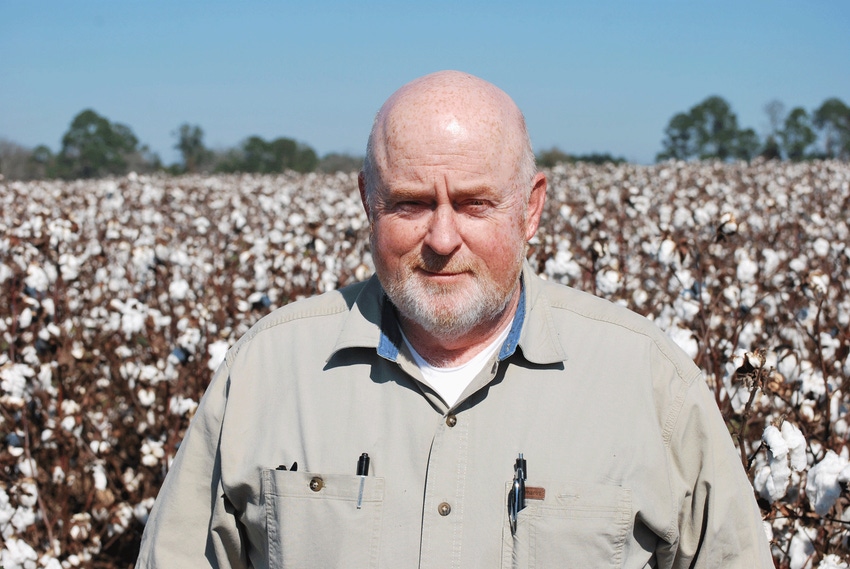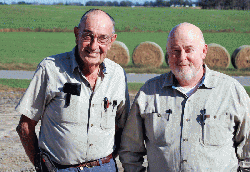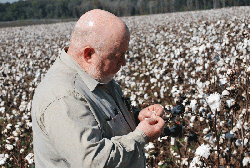
Three generations of Warbingtons farm together around Vienna, Ga., and each generation and individual contributes to the operation’s success. But someone has to keep the family business on point. That’d be Teel Warbington.
For the Warbingtons’ efficient and environmentally sound cotton production practices, based largely on Teel’s dedication to details, George “Teel” Warbington is the 2016 Farm Press/Cotton Foundation High Cotton Award winner for the Southeast region. He will be honored, along with producers from the Delta, Southwest, and West, at an awards breakfast Feb. 26 at the Mid-South Farm & Gin Show at Memphis.

Teel Warbington, right, along with his brother, James, started farming in partnership with their father, James D. Warbington, Sr., left, on a 500-acre farm more than three decades ago. Now, three generations farm in partnership, farming 1,600 acres of peanut, 750 corn, 550 wheat and 3,400 acres of cotton in 2015.
Teel Warbington, right, along with his brother, James, started farming in partnership with their father, James D. Warbington, Sr., left, on a 500-acre farm more than three decades ago. Now, three generations farm in partnership, farming 1,600 acres of peanut, 750 corn, 550 wheat and 3,400 acres of cotton in 2015.On a windy day in early November, and after more than 8 inches of rain had fallen on the farm the previous 10 days, Teel Warbington had six things going on, and a half dozen others awaiting his attention — from handling a sale and shipment of corn stored at the family’s grain facility, to trying to figure out defoliation and harvest efforts for a cotton crop that’d gotten too much late-season rain, to receiving delivery of and getting up-to-speed on a new Rogator that’d just arrived on the farm.
But despite the demands on his time, he was graciously accommodating to talk about the family farm.
Teel Warbington has farmed full-time for about 32 years. After graduating college in 1986, he started farming with his father, James D. Warbington, Sr., who still works every day on the farm and helps with everything from planting to handling part of the irrigation work. (The senior Warbington is quick with a story or a friendly quip, saying he does stuff on the farm nobody else wants to do.) Teel and his brother, James D. Warbington, Jr., are partners on the farm, along with James’ son, James D. Warbington III, and Teel’s son, George. (And there’s your three generations, working daily together.)
Back in 1986, Teel, James, and their father were partners on a 500 acre farm. And it wasn’t an easy start. “When I graduated college, I owed for one-third of a 500-acre farm,” Teel says. “We didn’t make a good crop for five years — and it’s only by the grace of God we’re still farming. At the time, if we were going to expand or stay in it, we had to get out there and scratch and scrap.”
The farm now has a dozen employees, and in 2015 they grew 1,600 acres of peanuts, 750 corn, 550 wheat, and 3,400 acres of cotton, including eight different varieties, a few from each of the major seed companies. They were selected to spread risk and to produce the highest yield and quality.
Season doesn't end when cotton is picked
The Warbingtons want to keep the farm going for as long as the next generations want to keep farming. With that goal, every bit of farmland the family has bought since 2010 is now split four ways: Teel’s son, George, and James’ son, James, each own a fourth, and Teel and his brother each own a fourth. They formed a limited liability company in order to handle the business end more efficiently and smoothly.
When George and James III each turned 18, a farm was put in their names, and Teel says, “I started them to farming. By the time they got out of college, both were established and on the tractor, and it was paid for.” He says he tried to get his son to use his college degree for something other than farming, but admits he’s glad George is farming.
When bringing the next generation into a farming operation, land stewardship as a priority — but it also makes good business sense.

Teel Warbington checks cotton in a field that had received near 8 inches of rain in 10 days in early November. Some seed sprouting? Yes, but the crop was rebounding well considering the late-season problems most Georgia growers faced in 2015.
Teel Warbington checks cotton in a field that had received near 8 inches of rain in 10 days in early November. Some seed sprouting? Yes, but the crop was rebounding well considering the late-season problems most Georgia growers faced in 2015.The Warbingtons begin each season by grid sampling fields, with the goal of applying fertilizer at a variable rate only where it is needed. They strip-till everything into cover crops, a practice they have followed for more than 15 years to maintain soil quality, control erosion, and increase water retention — all key steps in producing cotton in an environmentally friendly way.
Jay Porter is University of Georgia Extension agent in Dooly County, the Warbingtons’ home county, and nominated Teel for the High Cotton Award. “Among the many qualities that set Teel Warbington apart as a farmer are his leadership and cooperation with Extension and industry,” says Porter, adding that the Warbingtons have worked closely with local Extension on many projects that delivered beneficial information to all farmers in the area.
For diligent farmers, growing cotton doesn’t end when the crop is picked from the field. Yield and quality can vary drastically, and a good farmer knows which cotton came from which field, what went right and what went wrong. Teel keeps cotton variety data down to the field grid level.
The Warbington cotton is ginned at Coley Gin, run by father and son team Chuck and Matt Coley, both cotton industry leaders in their own right. The Coleys say none of their growers is a better cotton marketer than Teel, who stays tuned to market conditions and uses forward contracting, futures and options, and spot market sales to spread risk and protect revenue.
Keith Evans and Clay Ward, at Evans and Ward Crop Services, are the Warbingtons’ crop consultants. Both say Teel is one of the most adept farm managers with whom they work, that he has an uncanny ability to consider multiple scenarios and make informed decisions that most often turn out for the best from economic, agronomic, and natural resource conservation standpoints.
Precision stewardship
“The Warbington farm was one of our first customers to base precision soil samples and variable-rate lime and fertilizer on zones delineated from the yield monitor on a cotton picker. And Teel worked at length with UGA’s soil lab in a pilot program to better prepare the lab to handle the increased volume of work associated with precision soil sampling,” Evans and Ward say.
Derwin Hall is a principal loan officer at AgGeorgia Farm Credit and has handled the Warbington accounts there since 1998. “Teel maintains extremely accurate and detailed computer records for production costs and yields,” he says. “This gives them the ability to analyze what worked and what failed during the year. His recordkeeping system and management ability, both on the farm and in the office, set him apart — he more closely compares to a CEO of a large business.”
Teel’s wife, Jeanie, is a teacher. In addition to son George, they have two daughters: Lauren, an attorney, and Madison, who is earning her pre-veterinary degree at the University of Georgia. Teel has held leadership positions with the Dooly county Farm Service Agency and on the Fullington Academy School Board. He is the president of the Dooly County Farm Bureau and sits on the National Cotton Board.
About the Author(s)
You May Also Like






